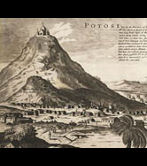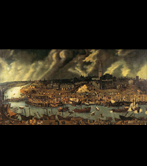Basque emigration to America
America has been a classic destination for Basques virtually ever since Columbus landed on the new continent. This emigration went through different stages: the first one linked with the conquest and colonisation, a later one connected with trading companies in the 18th century, followed by the exodus of people fleeing from war in the 19th and 20th centuries (including the Carlist wars, military service, the First World War and the exile following Franco's victory). Though it cannot be claimed that these movements have taken place in a continuous line for 450 years, it is undeniable that the consolidated presence of people of Basque origin facilitated the welcoming and integration of those who arrived there at different times.
However, the settlements created following the first landings in America were not without precedent. The migrations that occurred thanks to the Basque sailing and trading traditions had already developed institutions and ways of organising themselves in many different places away from home, both on Europe’s Atlantic coast (Flanders) and in the Mediterranean. In the latter area, Andalusia’s ports played a key role, one that was strengthened thanks to the American enterprise. Beyond the spirit of adventure, for evangelical or personal reasons, travelling to America represented the culmination of an adventure that was above all commercial and economic, and one in which the Basques had been involved for some time.
There were several factors that influenced the success of Basque emigration from its earliest days. Firstly, the services they had rendered in wartime (first against the kingdom of Granada, later against the Berbers, followed by the Turks, as Spain fought to gain military and trading supremacy in the Mediterranean) had consolidated the Basque presence in Andalusia from the 15th century onwards. Secondly, the legal status of universal nobility meant that they could work in any field, in both war and administration, without having to relinquish their habitual profession or trade. Thirdly, another notable feature was the way in which these communities functioned far from home, grouped together by family kinship and a sense of common origin that was reinforced by the use of their own language and the knowledge and trust that sharing common points of reference in their place of origin gave them. This union was expressed and strengthened by specific, austere religious practices that were initially based on the Franciscan order (the American Brotherhood of the Virgin of Arantzazu, for example). Thus, a route was established for the emigrant, who knew where he was going, not because he knew the place, but because he had access to an entire social fabric in which his place and his work was established. Making progress in it would depend on his aptitudes and ability to get on with others.
Zacatecas, New Mexico, Lima and Potosí are just some of the places where the Basque presence is omnipresent and differentiated, with the Basque nation functioning (in the words of the time) as a select, compact and effective minority, just like the Italians and the Portuguese. The incredible life of Catalina de Erauso, for example, cannot be truly grasped without bearing in mind this sphere of action and mutual protection. This form of solidarity became so strong, and differentiated the Basques as a group so much from the rest of the conquistadors and colonists, that it gave rise to confrontations between different groups in their struggle for power or a share of the profits. One example is the so-called "war of nations" around Potosí hill, when Basques, together with Cantabrians and people from the mountains of Burgos, confronted the “vicunas” (Castilians, Andalusians and Extremadurans). The latter, who were generally speaking excluded from the spheres of wealth and decision-making, set about changing the situation by taking up arms. It was a situation of open warfare which cost the lives of dozens of people during the first half of the 17th century and, over the medium-term, broke the Basques' control and monopoly over the hill.

_petita.jpg)


